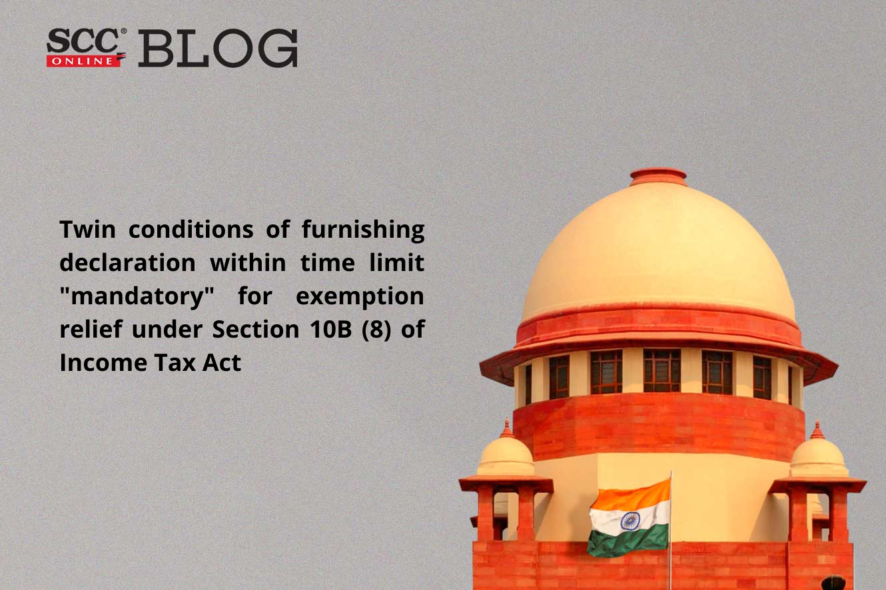Supreme Court: The bench of MR Shah* and BV Nagarathna, JJ has rejected the view taken by the Karnataka High Court and ITAT, Bangalore that the requirement of furnishing a declaration under Section 10B (8) of the Income Tax Act, 1961 (IT Act) is mandatory, but the time limit within which the declaration is to be filed is not mandatory but is directory. The Court held that the assessee shall not be entitled to the benefit under Section 10B (8) of the IT Act on noncompliance of the twin conditions as provided under Section 10B (8) of the IT Act.
In the case at hand, when the assessee submitted its original return of income under Section 139(1) of the IT Act on the due date i.e. 31.10.2001, it specifically stated that it is a company and is a 100% export-oriented unit, entitled to claim exemption under Section 10B of the IT Act and therefore no loss is being carried forward. However, thereafter the assessee filed the revised return of income under Section 139(5) of the IT Act on 23.12.2002 and filed a declaration under Section 10B (8) which admittedly was after the due date of filing of the original return under Section 139(1), i.e., 31.10.2001.
The ITAT as well as the High Court held that for claiming the so-called exemption relief under Section 10B (8) of the IT Act, furnishing the declaration to the assessing officer is mandatory but furnishing the same before the due date of filing the original return of income is directory. Aggrieved by the decision, the Revenue approached the Supreme Court.
The Supreme Court observed that the High Court and ITAT is erroneous and contrary to the unambiguous language contained in Section 10B (8) of the IT Act which provides that “where the assessee, before the due date for furnishing the return of income under sub-section (1) of section 139, furnishes to the Assessing Officer a declaration in writing that the provisions of Section 10B may not be made applicable to him, the provisions of Section 10B shall not apply to him for any of the relevant assessment years”.
Hence, for claiming the benefit under Section 10B (8), the twin conditions of furnishing the declaration to the assessing officer in writing and that the same must be furnished before the due date of filing the return of income under sub-section (1) of Section 139 of the IT Act are required to be fulfilled and/or satisfied. Both the conditions to be satisfied are mandatory.
“It cannot be said that one of the conditions would be mandatory and the other would be directory, where the words used for furnishing the declaration to the assessing officer and to be furnished before the due date of filing the original return of income under subsection (1) of section 139 are same/similar.”
The Court also considered the facts that in the case at hand the assessee filed its original return under Section 139(1) and not under Section 139(3). The revenue submitted that the revised return filed by the assessee under Section 139(5) can only substitute its original return under Section 139(1) and cannot transform it into a return under Section 139(3), in order to avail the benefit of carrying forward or set-off of any loss under Section 80 of the IT Act.
Agreeing with the Revenue’s submission, the Court explained,
“The assessee can file a revised return in a case where there is an omission or a wrong statement. But a revised return of income, under Section 139(5) cannot be filed, to withdraw the claim and subsequently claiming the carried forward or setoff of any loss. Filing a revised return under Section 139(5) of the IT Act and taking a contrary stand and/or claiming the exemption, which was specifically not claimed earlier while filing the original return of income is not permissible. By filing the revised return of income, the assessee cannot be permitted to substitute the original return of income filed under Section 139(1) of the IT Act.”
Therefore, it was held that claiming benefit under Section 10B (8) and furnishing the declaration as required under Section 10B (8) in the revised return of income which was much after the due date of filing the original return of income under Section 139(1) of the IT Act, cannot mean that the assessee has complied with the condition of furnishing the declaration before the due date of filing the original return of income under Section 139(1) of the Act.
Ruling in favour of the Revenue, the Court held that for claiming the benefit under Section 10B (8) of the IT Act, the twin conditions of furnishing a declaration before the assessing officer and that too before the due date of filing the original return of income under Section 139(1) are to be satisfied and both are mandatorily to be complied with.
Setting aside the judgment of High Court and ITAT, the Court held that the assessee shall not be entitled to the benefit under Section 10B (8) of the IT Act on noncompliance of the twin conditions as provided under Section 10B (8) of the IT Act.
[CIT v. Wipro Ltd., 2022 SCC OnLine SC 831, decided on 11.07.2022]
*Judgment by: Justice MR Shah
Counsels
For Revenue: ASG Balbir Singh
For Assessee: Senior Advocate S. Ganesh


